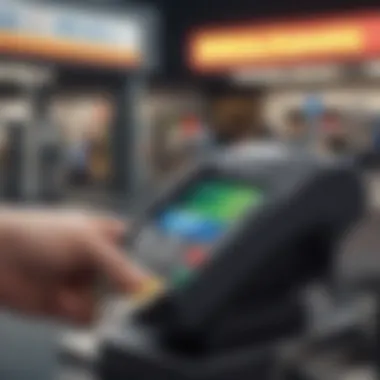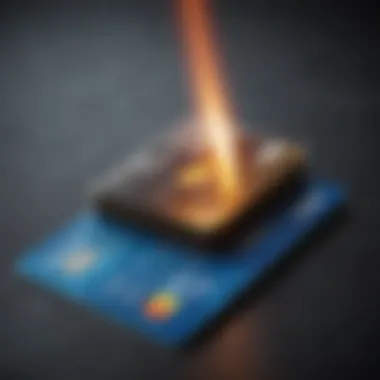Paying Your Gas Bill with a Credit Card: A Comprehensive Guide


Intro
The act of paying gas bills is a routine aspect of financial management for many households. Understanding the various methods available for this task, including credit card payments, holds importance not just from a convenience standpoint but also from a financial one. With the increasing prevalence of credit card usage, many may wonder about the implications of utilizing credit for paying utility bills. This article serves as a detailed exploration of the topic, navigating through the benefits and risks involved while delving into specific company policies and alternative payment methods. The aim is to equip the reader with the necessary knowledge to make informed decisions regarding credit card utilization for utility payments and to consider the impact of such choices on personal finances, especially credit scores.
Understanding Credit Scores
When considering the use of a credit card to pay gas bills, it is crucial to grasp the concept of credit scores. Understanding how your credit score operates can help you manage your finances more effectively.
What is a Credit Score?
A credit score is a numerical representation of your creditworthiness. It ranges from 300 to 850, with higher scores indicating better credit health. Lenders use this score to determine the likelihood of you repaying borrowed funds.
Importance of Credit Scores
Credit scores play a significant role in financial transactions. A good credit score enables access to favorable interest rates, more loan options, and sometimes even better service from utilities. Conversely, a poor credit score can limit financial opportunities and result in higher costs.
How Credit Scores are Calculated
Credit scores are derived from several factors:
- Payment History: Timely payments contribute positively, while missed or late payments can harm your score.
- Credit Utilization Ratio: This ratio measures the amount of credit used compared to your total credit limit. Lower ratios positively influence your score.
- Length of Credit History: A longer credit history can help improve your score.
- Types of Credit Accounts: A varied mix of credit accounts can be beneficial.
- Recent Credit Inquiries: Every time you apply for credit, an inquiry is made. Too many inquiries can negatively impact your score.
Common Myths About Credit Scores
Myths can lead to misconceptions about credit management. Understanding these can aid in better financial practices:
- Myth: Checking your own credit score harms it.
- Myth: Closing credit cards boosts your score.
- Myth: Paying bills on time guarantees a perfect score.
Understanding Payment Methods
Understanding the various payment methods available is crucial when considering how to manage utility bills effectively, particularly gas bills. Payment methods can impact both convenience and financial health. Choosing the proper method can lead to more efficient budgeting and improved credit scores. This guide will highlight the specifics of different payment options to ensure you make an informed choice.
An Overview of Payment Options
When it comes to paying your gas bill, there are several options you can utilize. These include:
- Credit Cards: A popular method due to rewards and convenience.
- Debit Cards: Offers a direct connection to your bank account, avoiding potential credit debt.
- Bank Transfers: Allows for easy transfer of funds directly from your bank.
- Cash or Checks: More traditional but less common with the rise of digital options.
Understanding these payment methods helps you recognize their strengths and weaknesses, which is important for making informed financial decisions.
Advantages of Using Credit Cards
Using a credit card to pay your gas bill can offer several benefits:
- Rewards Programs: Many credit cards provide points, cash back, or travel rewards for each dollar spent. By paying your gas bill, you can accumulate rewards more quickly.
- Convenience: Credit cards are accepted widely, and payment can often be completed online or through a mobile app.
- Building Credit: Regularly paying your gas bill with a credit card and making timely payments may improve your credit score. This is an excellent way for new borrowers to establish a good financial history.
- Tracking Expenses: Credit card statements can help track monthly expenses, making budgeting simpler.
Disadvantages of Using Credit Cards


Despite the advantages, there are downsides to consider:
- Interest Rates: If not paid off in full each month, interest on credit card debt can rise quickly, leading to higher costs over time.
- Fees: Some utilities may charge a convenience fee for using credit cards. This extra charge can negate the benefits of rewards.
- Over-spending Risk: The ease of swiping a card may lead to more spending than necessary. It's crucial to maintain discipline to avoid accumulating debt.
- Impact on Credit Score: If you max out your credit limit or miss payments, your credit score may suffer significantly.
Understanding payment methods is critical for optimizing financial stability while managing utility bills. Each option comes with its own set of advantages and disadvantages, particularly when considering credit cards. Choosing wisely can substantially affect your overall financial trajectory.
Can You Really Pay Your Gas Bill with a Credit Card?
Understanding whether you can pay your gas bill with a credit card is crucial. It offers potential benefits but also comes with certain considerations. Not all companies accept credit card payments for utility bills, and the processes can vary by region. Knowing about these specifics can help you manage your cash flow and maximize benefits, like rewards or cashback, associated with credit card use.
Exploring Company Policies
Gas companies have different policies regarding payment methods. Some may allow credit card payments directly, while others might not. It's important to check with your local gas provider about their specific policies. For example, companies like Duke Energy or Southern California Gas might have different rules than smaller or regional providers.
- Direct Payments: Many gas companies provide customers with online portals where credit card payments are accepted.
- Third-Party Services: If a company does not accept credit cards directly, you might find third-party payment services that allow you to pay your bill with a credit card. These services often charge a convenience fee.
You should carefully read terms and conditions of these services. Also, check if your payments count toward any credit card rewards. Always consider potential restrictions on what types of credit cards are accepted.
Common Accepting Practices
When it comes to accepting credit cards for gas bill payments, several practices are prevalent. First, online payments are usually the most convenient method. However, there are also various methods adopted by companies:
- Mobile Applications: Many utility companies offer mobile apps that streamline the payment process, allowing users to pay via credit card.
- In-Person Payments: Some gas companies allow payments in person at designated locations where you can use your credit card.
- Phone Payments: Some companies have automated phone systems that also accept credit card payments.
It is beneficial to familiarize yourself with these practices. Knowing what methods your gas provider offers can save you time and ensure your payment is processed efficiently.
Impact on Credit Score
Understanding the impact of paying your gas bill with a credit card is crucial for anyone looking to manage their finances more effectively. While using a credit card for utility payments can offer flexibility and potential rewards, it can also introduce complexities that may affect your credit score.
Credit Utilization Ratio Explained
One of the most important factors that determines your credit score is the credit utilization ratio. This ratio reflects the amount of credit you are using compared to your total available credit. For example, if you have a credit limit of $10,000 and you carry a balance of $3,000, your utilization ratio is 30%. Ideally, experts recommend keeping this ratio below 30% to maintain a healthy score.
When you use a credit card to pay your gas bill, you may temporarily increase your utilization ratio. If the payment is substantial and you do not pay it off right away, it can lead to a higher ratio. This can potentially lower your credit score if calculated at the time your creditor reports your credit data.
To mitigate this, try to pay off the credit card balance promptly after making the payment. This helps keep your credit utilization low and shows that you are responsible with credit. Remember, the credit card company usually reports your balance around the end of your billing cycle. Paying off the balance before that date can keep your utilization ratio favorable, thus protecting your score.
Payment History and its Significance
Payment history is another critical element influencing your credit score. It makes up a significant portion of your score calculations. Simply put, consistently making payments on time can positively impact your credit score, while late payments can cause your score to drop.
When you choose to pay your gas bill with a credit card, it’s vital to ensure that you are making timely payments. This not only applies to your gas bill payment but also to your credit card balance. If you carry a balance and miss payments, your credit report will reflect this, leading to a negative impact on your score.
Setting up reminders or automatic payments for your credit card can improve your chances of maintaining a good payment history. Furthermore, paying the full balance on your card each month can help you avoid interest charges while establishing a positive record.
Consistency in both setting up utility bill payments and managing your credit card can lead to a positive credit history.


In summary, understanding how utilizing a credit card for gas bill payments impacts your credit score is essential. By managing your credit utilization ratio effectively and maintaining a solid payment history, you can use credit cards as a tool for improving your financial health rather than a source of risk.
Fees and Additional Charges
Understanding the fees and additional charges that may apply when paying your gas bill with a credit card is essential. This knowledge allows you to make informed decisions. While convenience is a driving factor for many consumers, hidden costs can impact your overall payment strategy. Addressing these aspects ensures you maximize the benefits of using a credit card for utility bills.
Understanding Convenience Fees
Convenience fees are charges added by service providers for offering specific payment methods. When using a credit card to pay your gas bill, companies may impose a convenience fee. This fee is typically a percentage of the total bill or a fixed amount. It’s crucial to read the fine print on your utility company’s payment policy to fully grasp the fees involved.
- For example, if your gas bill is $100 and the convenience fee is 3%, you’ll pay $103 total.
- Some companies may also offer different options without a fee.
Always calculate whether the fee outweighs the rewards points or cashback you may earn from using your credit card, if applicable. It is a balancing act between convenience and costs.
Weighing Costs vs.
Benefits
When considering paying your gas bill with a credit card, evaluate the costs against the benefits. The potential for rewards is undeniably appealing, but are the fees worth it?
- Transaction Costs: Examine the convenience fees associated with payments. Multiply this by your average monthly gas bill to see the yearly impact on your finances.
- Rewards Programs: If your credit card offers rewards or cashback, account for these benefits. It can be advantageous, provided the fees remain manageable.
- Personal Budgeting: Paying with a credit card can also aid in tracking expenses. Statements can clarify spending patterns, which assists in budgeting efforts.
In summary, understanding the fees and weighing them against benefits will help you to make a nuanced decision. An informed choice will allow you to manage your gas payments more effectively while minimizing unexpected costs.
Alternatives to Credit Card Payments
When discussing how to manage gas bills, credit cards often dominate the conversation. However, exploring alternatives to credit card payments can reveal options that might better suit some individuals' financial circumstances. Each alternative offers distinct advantages and considerations, making it essential to assess personal needs thoroughly. Understanding these alternatives can lead to effective financial management and enhance understanding of utility payments.
Debit Card Payments
Using a debit card is a straightforward alternative to a credit card for paying gas bills. Debit cards function similarly to credit cards but draw funds directly from the user's bank account. This can prevent debt accumulation since the payment is limited to the available balance in the account. One key advantage is the immediate impact on cash flow. As soon as the payment is made, the funds are withdrawn, thus eliminating the risk of overspending.
In addition, many companies accept debit cards without incurring extra fees, making it a cost-effective solution. However, users should monitor their account closely to avoid overdraft fees and ensure sufficient funds are available for payment.
Considerations for Debit Card Use
- Budget Control: Since payments come from your checking account, it may encourage responsible spending.
- Accessibility: Most utility companies now widely accept debit cards, making payment easy.
- Low Risk: Less chance of racking up debt compared to credit cards.
Direct Bank Transfers
Direct bank transfers, also known as ACH transfers, represent another viable option for paying gas bills. This method allows customers to electronically transfer funds from their bank account to the utility company. Though seemingly more complex, this can be an efficient payment method.
For the user, the main benefits include automation capabilities and generally lower fees. Direct bank transfers can be set up for automatic payments, ensuring utility bills are paid on time without manual intervention. Additionally, this method often entails fewer processing fees compared to credit cards.
Important Aspects of Direct Bank Transfers
- Automation: Set and forget payments, reducing the likelihood of late fees.
- Efficiency: Typically, transfers are completed quickly, leading to timeliness in payment.
- Cost-Effective: Often associated with lower fees than credit card payments.


Choosing the right payment method, whether it is a debit card or direct bank transfer, requires evaluating personal financial habits and preferences.
Understanding and implementing these alternatives can lead to smarter financial choices. With the right payment strategy, one can avoid unnecessary complications while managing gas bill payments effectively.
Best Practices for Managing Utility Payments
Managing utility payments efficiently is paramount for ensuring financial health and stability. In this context, best practices refer to strategic approaches that can streamline the process, reduce stress, and avoid late fees or penalties. Adopting effective payment methods can also enhance budgeting processes and improve credit scores over time.
Setting Up Automatic Payments
One of the most effective strategies for managing your gas bill is to set up automatic payments. This feature allows payments to be deducted from your bank account on a scheduled basis, ensuring that your bill is paid on time without manual intervention.
Benefits of Automatic Payments
- Convenience: Automatic payments save valuable time and eliminate the hassle of remembering due dates.
- Avoiding Late Fees: Late payments can incur fees that increase your bill. Automatic payments help mitigate this risk.
- Budgeting Ease: Knowing exactly when payments will be taken allows for better financial planning.
- Potential Discounts: Some gas companies offer discounts for setting up automatic payments as it reduces their administrative costs.
However, it is crucial to monitor your bank account to ensure funds are available on payment days. Failure to have sufficient funds can lead to overdraft fees, which negate the advantages of this payment method.
Tracking Utility Expenses
Tracking utility expenses is another essential practice that informs better financial decision-making. Keeping tabs on what you spend on gas can offer insights into your energy usage and help identify areas for potential savings.
Utilizing Tracking Tools
- Monthly Statements: Regularly review your monthly bills to examine spending patterns.
- Spreadsheets or Apps: Use spreadsheet software or budgeting apps to record your expenses. This can streamline comparison over time.
- Set Budgets: Establishing a budget based on historical data can help manage spending expectations.
- Adjust Based on Trends: If you notice spikes in consumption, consider reviewing your energy usage or contacting your provider for tips on efficiency.
By keeping an eye on these aspects, you can maintain control over your finances and make informed decisions about your utility payments.
Final Considerations
When contemplating the option of paying your gas bill with a credit card, it’s essential to examine several key factors. This section addresses personal financial goals and future trends in utility payments that shape the context of such decisions. Understanding these elements provides clarity on the appropriateness of utilizing credit cards as a payment method for utility bills.
Assessing Personal Financial Goals
Before using a credit card for your gas bill, consider how this aligns with your personal financial objectives. Setting clear goals is pivotal in managing your finances effectively. For instance, are you aiming to build your credit score? If so, making timely bill payments with your credit card can contribute positively to your credit history.
Another element to assess is your budget. Paying with a credit card could be beneficial if you can pay off the balance in full each month, avoiding high-interest charges. Nonetheless, if you tend to carry a balance, it may lead to unnecessary debt accumulation, counteracting your long-term financial strategies.
Here are several aspects to evaluate:
- Current Debt Levels: Analyze your existing debt. If you have a significant amount, adding more may not align with your goals.
- Credit Utilization Ratio: Maintaining a low utilization ratio is vital. If utilizing your credit card for gas bills increases your ratio beyond 30%, it might adversely affect your score.
- Building Rewards: Some credit cards offer reward points or cashback on utility payments. This could enhance your overall financial health if utilized properly.
By weighing these factors, you can make more informed decisions about using credit cards to pay your gas bills, ensuring alignment with your financial ambitions.
Future Trends in Utility Payments
The landscape of utility payments is evolving rapidly. New technologies and consumer preferences are reshaping how individuals settle their bills. Anticipating future trends can offer insights into how you manage utility payments.
Several notable changes are appearing in the payment landscape:
- Mobile Payments: More gas companies are now accepting mobile payment platforms, allowing a quicker and more convenient way to pay. This trend is likely to grow, enabling consumers to manage their bills seamlessly through apps.
- Automated Payments: Increasingly, companies are encouraging automated payments to streamline the billing process. While this assists in avoiding late fees, it must be approached carefully, ensuring sufficient funds are available in your account.
- Green Energy Options: With rising interest in sustainable practices, many utility providers are exploring options that focus on eco-friendly energy. Payment methods that support such initiatives may gain popularity in the coming years.
These insights reveal that adapting to changes in payment trends could not only simplify your payment processes but also lead to a more sustainable and efficient way of managing utility costs.
As we move forward, it will be crucial to stay informed about these trends. They might influence how you choose to pay your gas bill, ensuring that your methods remain relevant and beneficial.







